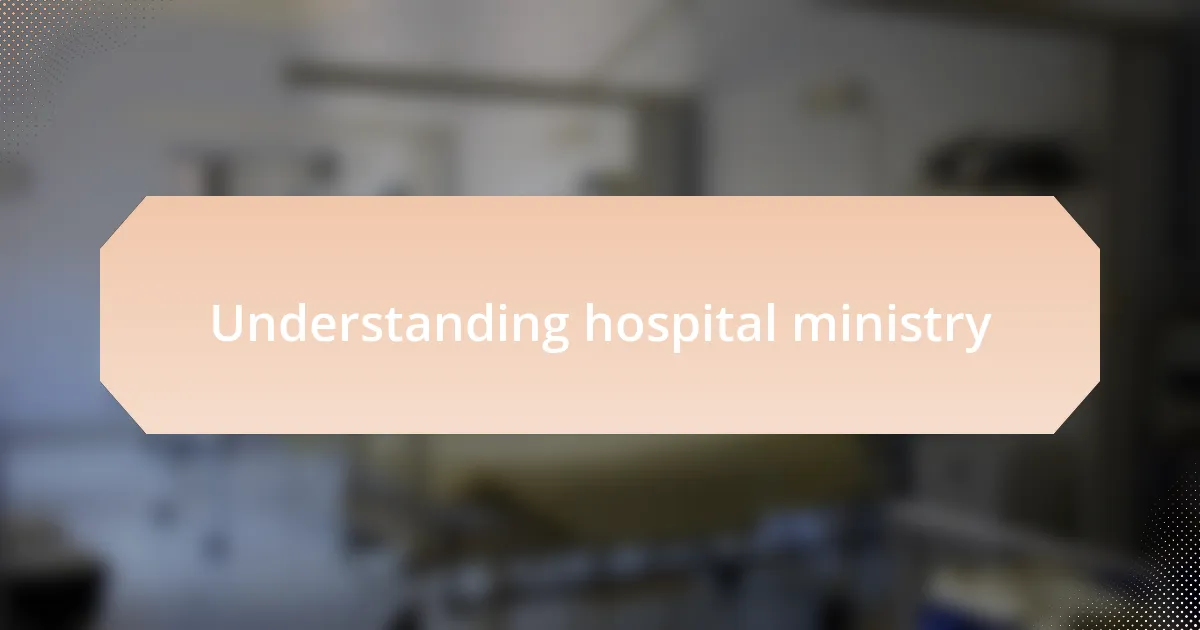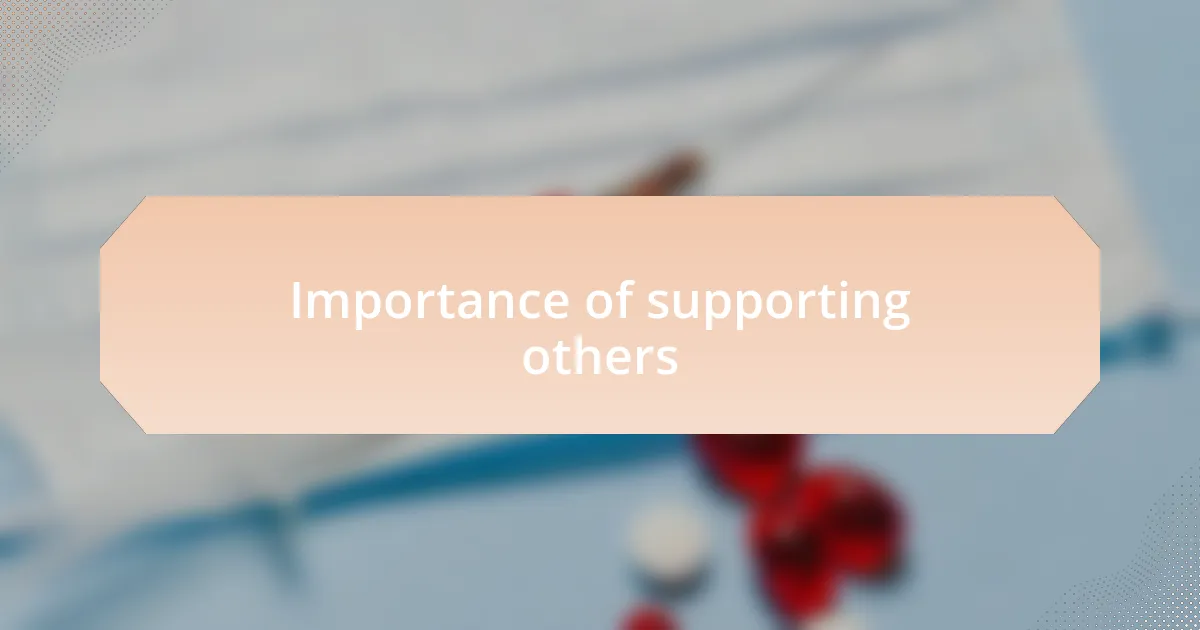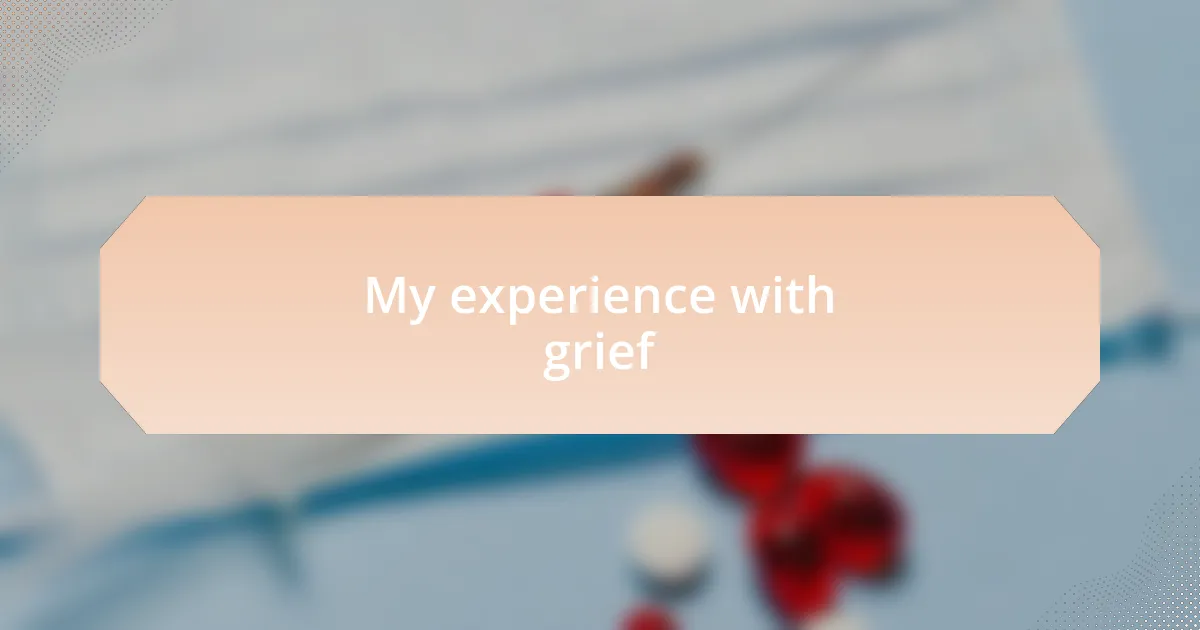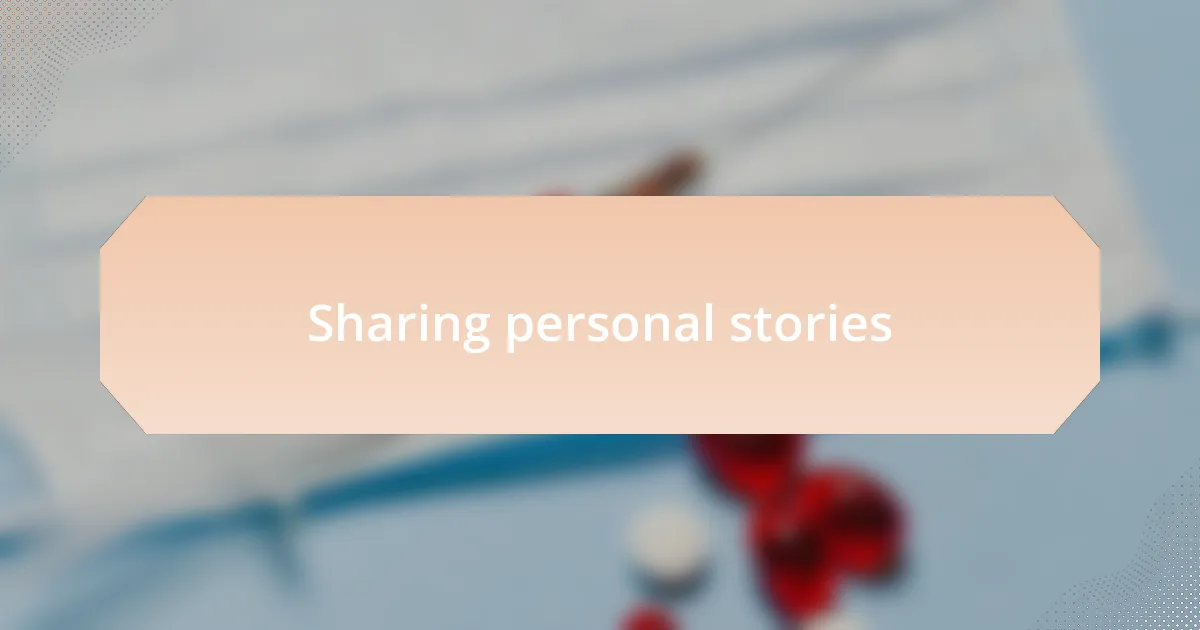Key takeaways:
- Hospital ministry provides essential spiritual and emotional support, fostering deep connections through simple gestures and active listening.
- Supporting others in grief not only helps them but can also facilitate personal healing and growth for the supporter.
- Personal stories shared during times of grief can create empathy, transform isolation into connection, and foster supportive environments.
- Building lasting connections in grief often involves being present and vulnerable, strengthening bonds through shared experiences.

Understanding hospital ministry
Hospital ministry is a vital aspect of supportive care, providing spiritual guidance and emotional support to patients and their families during some of life’s most challenging moments. I vividly recall a time when I sat with a family facing a difficult diagnosis. The fear in their eyes mirrored the uncertainty in my heart, yet through conversation, I witnessed how a shared moment of vulnerability brought comfort to us all.
In these environments, ministry goes beyond mere presence; it’s about actively listening and being attuned to the unspoken needs of those we serve. Have you ever considered how a simple gesture, like holding a hand or offering a prayer, can create a sense of hope? I have seen firsthand how these small acts forge deep connections, transforming fear into peace and isolation into community.
Additionally, hospital ministry encompasses various practices, from providing spiritual resources to facilitating support groups. I remember engaging with a young woman who was grappling with her own mortality while trying to support her ailing parent. Our conversations became a lifeline for her, reminding me of how essential it is to nurture both the spirit and the heart in times of crisis. Each story shared is a testament to resilience, serving as a reminder that we are never truly alone in our struggles.

Importance of supporting others
Supporting others in their time of need is not just an act of kindness; it’s a profound commitment to shared humanity. I recall a moment when I found myself in the hospital lobby, comforting a father visibly shaken by his child’s surgery. The strength in his grip as he held my hand spoke volumes about the weight of his worry. In those moments, I discovered how offering my presence wasn’t merely support; it was an essential lifeline for both of us.
I’ve often found that when we support others, we, in turn, nurture our own healing. The connection forged through empathy can be transformative. I remember a conversation with a grieving woman who was hesitant to share her pain. As I listened to her story, I realized that each tear shed was a step toward collective healing. How many times have we held back our own emotions, thinking we’ll burden others? In actuality, sharing our struggles can lighten our loads and create bonds that sustain us through grief.
Moreover, the act of supporting others encourages personal reflection and growth. One time, during a support group I facilitated, a participant shared how helping others allowed her to see her own grief more clearly. It struck me that in nurturing others, we often find insights that pave the way for our healing journey. Isn’t that the paradox of support? By extending our hands to lift others, we discover that our own burdens become a little lighter.

My experience with grief
Grief has shaped my life in ways I never anticipated. I remember the moment I lost a close friend; it felt as if the world had dimmed. In those early days, I wandered through a fog, grappling with sorrow and the glaring absence of their laughter. It was during this time that I realized how isolating grief can be. Yet, I found solace in sharing my feelings with others who had experienced loss, reinforcing the idea that we are not alone in our pain.
During my darkest moments, I was drawn to the stories of others like a moth to a flame. One evening, I sat with a widow who recounted the last days of her husband’s battle with illness. Her words resonated deeply with me, shining a light on my own heartache. It struck me that in hearing her story, I was not just a passive listener; I was also finding threads of my own experience woven into hers. Have you ever felt that connection while sharing your grief? It transforms solitary sorrow into a shared journey of healing.
I also learned that grief is not a linear path, but rather a winding road with unexpected detours. I recall a day when I unexpectedly burst into tears while seeing a couple who reminded me of my friend and me. As I navigated the waves of emotions, I understood that embracing these bursts of grief could be liberating. Why do we shy away from the rawness of our feelings? In my experience, it’s in these moments of vulnerability that we find true connection, the kind that fosters understanding and support among those who are also grieving.

Ways to offer support
When offering support to someone in grief, one of the simplest yet most impactful things you can do is to just be present. I remember a time when a friend lost her mother, and instead of trying to find the right words to comfort her, I simply sat with her on the couch, sharing silence. It’s surprising how comforting that quiet companionship can be, reminding someone that they don’t have to face their pain alone.
Encouraging others to express their feelings can also be incredibly valuable. I once hosted a small gathering for friends mourning the loss of a mutual acquaintance. I encouraged everyone to share their favorite memories, and as stories flowed, the room became filled with laughter and tears alike. This wasn’t just about remembering the good times; it was about creating a space where emotions could surface freely, allowing us all to heal together. Have you ever participated in a gathering like that? It can be a profoundly unifying experience.
Another effective way to support someone is by checking in regularly. I learned this from a colleague who lost her partner; the weeks following the funeral were incredibly lonely for her. I made it a point to text her once a week, asking how she was doing or inviting her for coffee. This small gesture showed her that she was still in my thoughts and that her grief didn’t have an expiration date. It’s easy to forget that just a text or a call can mean the world to someone grappling with loss.

Practical strategies for hospital visits
When visiting someone in the hospital, it’s essential to gauge their energy levels and emotional state. I recall visiting a dear friend who was recovering from surgery. I arrived with a bright bouquet and a cheerful attitude, only to find she was exhausted and overwhelmed. I learned then that matching your approach to their need for quiet or conversation can create a much more comfortable atmosphere.
Bringing along a small care package can also be an excellent way to show you care, while being mindful of hospital policies on outside items. On one visit, I brought my friend his favorite puzzle book and some snacks. Watching him engage with those small delights reminded me of how even minor comforts can break the sterile monotony of a hospital room. Isn’t it interesting how little things can carry so much emotional weight during difficult times?
Finally, remember that listening is a gift, especially inside a hospital. I once sat with a colleague who was facing multiple health challenges. As I listened to her fears and hopes for recovery, I felt a connection deepen between us. By allowing them to share, you’re not just being a visitor; you’re becoming a part of their healing journey. How can we ensure our presence is a source of strength in these moments? Being genuinely attentive can turn a simple visit into a significant support moment.

Sharing personal stories
Sharing personal stories can be incredibly powerful during times of grief. I remember during one visit, I shared my experience of losing a loved one. When I recounted how I found solace in moments of solitude, it seemed to resonate deeply with the patient I was visiting. Seeing her nod in understanding reminded me of how sharing our vulnerabilities can create a bridge of empathy.
There was another instance when I listened to a woman recount her journey with loss. As she shared her struggles, I quietly related my own stories of heartache and healing. The emotional exchange not only helped her feel less alone but also illuminated the common ground we often overlook. Isn’t it amazing how our stories can transform isolation into connection, fostering a supportive environment?
I’ve found that when people hear personal narratives, it can shift their perspective. For example, during a group therapy session, I shared a story about how grief taught me resilience. Afterward, others began sharing their experiences, creating a supportive circle where emotions flowed freely. These moments made me realize that our pain can indeed be a source of hope and understanding for those around us.

Building lasting connections
Creating lasting connections often stems from the simple act of being present with someone in their grief. I remember sitting quietly with a friend who had just lost her father. Instead of filling the silence with words, I held her hand, letting her know she wasn’t alone in that tough moment. That silent connection spoke volumes and reminded me that sometimes, our presence is the greatest gift we can offer.
There have been many occasions where a shared moment of vulnerability sparked unexpected friendships. I recall a support group where a participant opened up about feeling disconnected from her family after her loss. As I listened, I felt compelled to share how my own family dynamics had shifted after a similar experience. This exchange opened a door for deeper conversations and, before long, we were exchanging contact information—two grieving hearts finding solace in shared understanding. Isn’t it remarkable how similar experiences can foster new connections?
Through my experiences, I’ve learned that the most profound connections often arise when we allow ourselves to be vulnerable. When I attended a grief support workshop, I shared a heartfelt letter I had written to my late grandmother. The tears shed in that room transformed strangers into confidants as we all recognized pieces of our own stories in each other’s pain. It reinforced my belief that while grief can isolate us, it also has the power to unite us in profound ways.